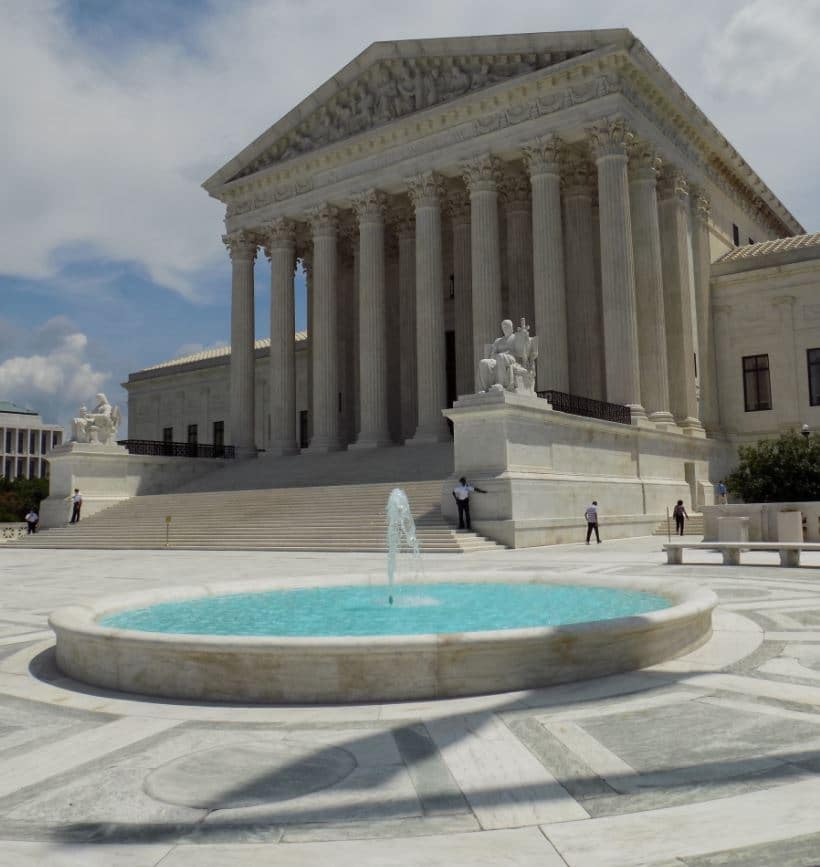Partisan Gerrymandering Beyond the Reach of Federal Courts

WASHINGTON – Partisan gerrymandering claims present political questions beyond the reach of the federal courts, a divided U.S. Supreme Court ruled Thursday.
The ruling, written by Chief Justice John Roberts, means that federal courts now will have no role in reviewing partisan gerrymandering claims.
Writing for the majority in the 5-4 decision, Roberts acknowledged that “excessive partisanship in districting leads to results that reasonably seem unjust.”
But he went on to write that “the solution lies with the federal judiciary. We conclude that partisan gerrymandering claims present political questions beyond the reach of the federal courts.”
In explaining his reasoning, Roberts wrote that none of the proposals the court reviewed for evaluating such gerrymandering claims meet the need for there to be a limited, precise standard that can be applied in such cases.
“No one can accuse this Court of having a crabbed view of the reach of its competence,” Roberts wrote. “But we have no commission to allocate political power and influence in the absence of a constitutional directive or legal standards to guide us in the exercise of such authority.”
In a stinging dissent in which she was joined by Justices Ruth Bader Ginsburg, Stephen Breyer and Sonia Sotomayor, Justice Elena Kagan said, “the partisan gerrymanders here debased and dishonored our democracy, turning upside-down the core American idea that all governmental power derives from the people.”
“For the first time ever, this Court refuses to remedy a constitutional violation because it thinks the task beyond judicial capabilities,” she added.
Kagan added: “Of all times to abandon the Court’s duty to declare the law, this was not the one. The practices challenged in these cases imperil our system of government. Part of the Court’s role in that system is to defend its foundations. None is more important than free and fair elections.”
She closed her dissent saying it was written “with respect, but deep sadness.”
Holder Sees Tear in Fabric of Democracy
Former Attorney General Eric Holder, chair of the National Democratic Redistricting Committee, said the high court’s decision to allow partisan gerrymandering “tears at the fabric of our democracy and puts the interests of the established few above the many.
“Taken together with Citizens United, which allows unlimited money in our electoral system, and Shelby County, which gutted the Voting Rights Act, this ruling means the Roberts Court has entered a new political Lochner era,” Holder said. “History will not be kind in its assessment of the ways in which this court has undermined voting rights and core democratic principles in America.”
The Lochner era to which Holder referred is the period in American legal history, roughly from 1897 to 1937, during which the Supreme Court was said to play a judicially activist but politically conservative role. The era takes its name from a 1905 case, Lochner v. New York.
Thursday’s ruling puts to rest long-running fights over gerrymandering in two very different circumstances.
In one, out of North Carolina, the issue was that Republican state lawmakers drew a map in 2016 that gave their party a distinct edge over Democrats in congressional races and was meant to ensure the GOP would maintain its 10 member to 3 member margin in the state’s congressional delegation.
The case, Rucho v. Common Cause, No. 18-422, was an appeal from a decision in August by a three-judge panel of a Federal District Court in North Carolina. The ruling found that Republican legislators there had violated the Constitution by drawing the districts to hurt the electoral chances of Democratic candidates.
The other case ended by Thursday’s ruling was out of Maryland.
Lamone v. Benisek, No. 18-726, was brought by Republican voters who said Democratic state lawmakers had in 2011 redrawn a district to retaliate against citizens who supported its longtime incumbent, Representative Roscoe Bartlett, a Republican.
That retaliation, the plaintiffs said, violated the First Amendment by diluting their voting power.
Last year, after the Supreme Court returned the case to the United States District Court in Maryland, a three-judge panel of that court ruled for the challengers, barred state officials from conducting further congressional elections using the 2011 maps and ordered them to draw new ones.
Anticipating the criticism from Kagan and others, Roberts wrote that the majority’ conclusion does mean the high court condones partisan gerrymandering, “nor does our conclusion condemn complaints about districting to echo into a void.”
He noted that several states are currently taking steps to address the issue, and that Congress also has the power to do so.
“We express no view on any of these pending proposals. We simply note that the avenue for reform established by the Framers, and used by Congress in the past, remains open,” Roberts said.
Lawmakers Respond
House Majority Leader Steny Hoyer, D-Md., said in a statement that “today’s Supreme Court decision only further highlights the need for national, comprehensive redistricting reform.
“Both parties have used the redistricting process for partisan ends; only through the mutual agreement and cooperation of both parties will this practice end,” he said.”The House took action in March, when we passed the For the People Act, to end partisan redistricting on a national basis. I strongly urge the Senate to take up our legislation and pass it. We must ensure that all Americans’ voices are equally heard in Congress.”
Within minutes of Thursday’s ruling, the Blue Dog Coalition of House Democrats announced it had endorsed two pieces of legislation authored by Representative Jim Cooper, D-Tenn., to stop partisan gerrymandering and “expose the secret congressional redistricting process to all Americans.”
According to the Cook Political Report’s most recent Partisan Voting Index, only 20 percent of House districts are considered competitive—a 56 percent decline over the past 20 years.
After the 2016 election, the number of swing seats dwindled to a record low of 72 out of 435. More than 58 percent of House districts are considered extremely partisan, contributing to the paralysis in Congress in recent years.
The Blue Dog Coalition has made addressing the issue a priority for years. On Thursday, Cooper said, “voters ought to be able to choose their elected officials—not the other way around.
“The redistricting process is rigged, and we need to fix it,” he added.
The first of Cooper’s bills, H.R. 130, also known as the John Tanner Fairness and Independence in Redistricting Act, was named after former Congressman John Tanner, a founding member of the coalition and a champion of ending the practice partisan gerrymandering.
Under the bill, each state would be required to establish an independent, bipartisan redistricting commission to redraw congressional district lines once every 10 years that reflect contiguous communities. These districts would replace gerrymandered districts that protect partisan seats.
Cooper’s second bill, H.R. 131, also called the Redistricting Transparency Act of 2019, would require states to publicize redistricting information online, including the data used in the process, details of the process, proposed maps and public hearing dates. It also would require that the public be allowed to comment before maps receive final approval.
“The redistricting process should never be used as a lever of power for one party over the other—it should ensure the American people are accurately represented in Congress,” said Representative Lou Correa, D-Calif., Dog co-chair for communications. “As a result of partisan gerrymandering, we have made it harder to elect those representatives who will work together to get things done and make a difference. We’ve seen that nonpartisan independent commissions work in several states, including California, and we know it can work across the country.”
With its ruling, the Supreme Court will now send both the Maryland case and the North Carolina case back to the lower courts with instructions to dismiss for lack of jurisdiction.
























